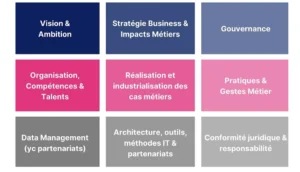AI, Data, Digital & Technologies
The massive and rapid arrival of technologies stemming from artificial intelligence and digital innovation is shaking up the economy, offering companies new opportunities such as redefining business models, accelerating processes, and innovating in services, but also bringing new challenges: the transformation of work and skills, emerging issues around European sovereignty and regulation, and growing expectations in terms of ethics, digital responsibility, and ecological transition.
How we support
our clients
We support executive leadership teams in harnessing the full potential of technologies while building sustainable success – economic, human, and ecological. We help them navigate the transformations they must undertake to adapt to those new challenges, enabling them to act with discernment and control.
Our teams are made up of economists, data and tech experts, and strategy and transformation consultants with a deep understanding of sector dynamics. They craft their recommendations with pragmatism, using proven methods tailored to our clients, and with complete independence.
We address the following challenges:
- Deploying AI within the company
- Structuring and capitalizing on data assets
- Establishing governance and data management
- Industrializing use cases
- Optimizing commercial strategy and revenue management
- Building the IT function of the future


We help executive teams unlock the full potential of technology while creating lasting success – economic, human, and environmental.
Our
capabilities

Artificial
Intelligence
AI unlocks the full potential and new value of the data we collect, and could become a key driver of growth and performance for business and operational models, while ushering in a new balance between humans and technology.
It is essential to address the following questions:
- What is the impact of AI on our business model and the way we work? What opportunities does it offer?
- How can we successfully achieve our AI-driven transformation?
- What are the social and environmental impacts of its use?
- What regulatory framework applies? How can we integrate AI while staying true to our ethical principles?
All these questions should be considered with the support of our experts dedicated to AI- and data-driven transformation challenges, through the lens of our Enterprise Transformation by AI (ETBAI) model: our methodological framework that helps clients undertake their systemic transformations through technology.
ETBAI combines strategic thinking with operational action – the best way to move forward with confidence in an “AI-shaped” world, securing investments, embedding change into the daily life of teams, and avoiding reliance on the short-term, overhyped promises of technology.
ETBAI
Our team is made up of over 50 experts who provide insights into integrating AI:
- Awareness building: shareholders, executive committees, managers, and employees
- Innovation and foresight: towards the AI-native enterprise
- Strategy, AI maturity assessment, and AI roadmap
- Development of business use cases, combining decision-making and generative AI
- Implementation and optimization of your AI Factory, including partnership strategies
- Two-sided platforms, with support for the transition
Our deep understanding of technology, combined with our sector expertise, enables us to guide you in scaling AI — the pre-required condition for efficient and truly successful integration — as well as in managing the transformation driven by the impacts of this scaling process.
We therefore support you end-to-end in the deployment of AI — a technology that touches every part of the organization, compels the reinvention of the business model, and opens an unprecedented field of opportunities.


IA &
Data Game Changer
For the past 20 years, data technologies have been accelerating and providing new ways to collect and leverage data. Gaining control over a market’s value — by enhancing customer knowledge through informed insights and optimizing operations management — is now possible thanks to data.
We support our clients throughout their data journey: from running awareness-building seminars to implementing disruptive business models, via conducting data diagnostics across the value chain and providing an initial assessment of the human, financial, and technological resources required, through to the decision-making and steering phases, and the improvement of existing systems.

Operational
use case
The enormous potential of data often remains untapped. The challenge? Successfully collecting and leveraging that data by integrating it quickly and with the right level of ambition into an existing business.
We help our clients select use cases that can deliver short-term ROI and a competitive edge on issues such as pricing, marketing mix optimization, cross-sell/upsell, assortment and turnover optimization, purchasing, key account management, and customer acquisition. We build complex simulation models based on highly granular data, applying systematic de-averaging to isolate effects, and propose target scenarios.
Industrialization
of the data sector
Because it amplifies strategy and operational models, data represents a major strategic opportunity for the next 10 years. It is also a lever of corporate responsibility, to be activated across four domains: engagement and trust, value sharing, decision-making control, and serendipity. These are all issues to anticipate in order to best organize a data strategy.
We work with our clients across four areas to progressively reach industrial-scale capability:
- Strategy: by putting data at the heart of the company
- Proofs: MVP, foundation building, etc.
- Scale-up: developing industrial capabilities – transforming the business model, operational models, and processes, cognitive factory, etc.
- Run: maintaining operational conditions for the foundation, resources, and governance, and periodically reviewing models.

New Business Model
factory
The possibilities offered by leveraging data and digital technologies (AI, machine learning, software-driven solutions, etc.) are endless. We help capitalize on these possibilities to open up new competitive fields.
We support the design of these new business models with multidisciplinary teams, using a pragmatic approach that delivers concrete, measurable results both in POC phases and during scaling-up stages.

Digitalization
of customer relations
We help our clients refine their understanding of target customers — their expectations and behaviors — to identify the right use cases and build their own path toward digitalizing the customer relationship.
We support our clients on three levels:
- Identifying and prioritizing digital growth levers
- Developing e-commerce growth and omnichannel performance
- Building customer relationship strategies

Digitalization
operational model
We support our clients in the digital transformation of their operating model and business processes, in parallel with the digitalization of customer experience, to enhance operational efficiency while fostering cultural change.
We help them identify and activate optimization levers — such as streamlining and improving the productivity of operational tasks, automating and digitizing processes, reducing processing times, and collecting and consolidating data — and guide the evolution of business functions (supply chain, marketing, operations, etc.) toward “augmented” functions. This includes, for example, automating real-time price or assortment adjustments and enabling assortment or supply forecasting.

Double-sided
platforms
Double-sided platforms are massive, scalable, and enable the rapid development of activities on a global scale. Present in both B2C (hospitality, retail, tourism, luxury, leisure, etc.) and B2B (advertising, logistics, industry, services, etc.), they continue to grow, generating colossal margins compared to traditional business models.
When the creation of a double-sided platform is under consideration, we help our clients analyze opportunities (business and financial stakes, intermediation risks, overview of ongoing market initiatives), design the service offering, select the “distribution” scenario (maximizing value while limiting intermediation), and prepare the implementation as well as the conditions for operating the platform.

Building the IT
of the future
We help the IT function address the challenges brought by AI, digital, and data — and their pace of change. We support CIOs in their IT strategy and master plan projects, digital architecture, IT organization, and efficiency initiatives, working on key questions such as: What is the right organizational model for the IT function? Which approach should be chosen between legacy and pure player? Which technology investments should be prioritized? What master plans should be adopted? What Make or Buy or Rent strategy should be chosen? What is the best economic model for the IT function? How can you retain and attract distinctive skills?

Economics
to shape business
The use of economics — the science of choices and incentives—and its rigorous way of thinking makes it possible to address corporate challenges as an architecture of interactions to be intelligently balanced. Our economist’s approach helps bypass potential biases in data analysis, distinguish causality from correlation, and rapidly extract insights that are valuable for business.
This perspective plays a key role in the decision-making process. It enables the simulation of scenarios based on rational or semi-rational behaviors, while factoring in market constraints.
Strategic
collaborations
These few projects reflect our commitment to helping our clients combine economic, social, and environmental performance in the pursuit of sustainable success.
Focus on
our specialist teams
Kéa Euclyd
KéaEuclyd supports executive management teams in accelerating the transformation of their businesses in the digital era, remaining fully independent from any solution providers and combining three perspectives: business, human, and technology.

Veltys
French strategy consulting firm specializing in data intelligence, founded in 2013.
Combining economic theory, data science, AI, technology, and data management, Veltys offers tailored support to redefine corporate strategy and operations on topics related to AI and the data continuum.














